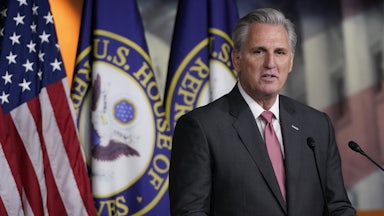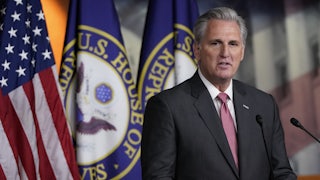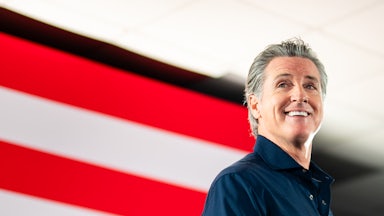It surely came as no surprise to anyone in the publishing industry when Judge Florence Pan blocked a proposed merger between Penguin Random House and Simon & Schuster—the country’s two largest publishers—late on Halloween night. No one had any idea what the proposed entity would be named; surely “Penguin Random House & Simon & Schuster” would prove to be too much of a mouthful, even if it was shorthanded as, say, “PRH/S&S.” No matter: The fate of the proposed behemoth was made clear many months ago in the courtroom. By the time the trial’s third week began in mid-August, everyone could plainly see that the Department of Justice had gained the upper hand and the merger was doomed. The only remaining question was how Pan would justify the decision.
Pan’s reasoning is still under seal—the Department of Justice, Penguin Random House, and Simon & Schuster have until November 4 to file redactions. Penguin Random House has indicated that it plans on appealing the ruling, which means that a new publishing Death Star may yet come into being. Nevertheless, the decision is an extraordinary step forward for supporters of an antitrust revival, with seismic ramifications that extend far beyond the publishing world.
For decades, the Department of Justice has pursued antitrust primarily on the narrowest of grounds: As long as customers aren’t harmed—which is to say as long as prices do not rise—then there is no cause to intercede. The Justice Department pursued a different approach, however, in the PRH/S&S matter, arguing that the proposed merger would harm top-tier authors by driving down advances as a consequence of less competition. This is not a novel approach to making such cases by any means, but it’s a line of reasoning that the DOJ hasn’t taken for some time. This way of thinking about the harms of monopoly carries profound and potentially explosive implications, though: There is now case law being built that could ultimately target some of the country’s biggest corporations, such as Facebook and even the behemoth that has actually dominated the publishing industry for the past three decades (and that dwarfs Penguin Random House—or PRH/S&S, for that matter): Amazon.
For the publishing industry, the verdict brings more uncertainty. My conversations with publishing employees, agents, and executives suggested that there was a sizable amount of anxiety about the merger, should it have been allowed to move forward. There were understandable concerns that the merger would not only drive down advances but lead to layoffs, the shuttering of imprints, and, ultimately, a marketplace that was worse off for authors and for readers.
And yet considerable anxiety remains even after the merger was blocked. Layoffs at Simon & Schuster were thought of as inevitable, regardless of who ultimately might acquire the firm, though Penguin Random House has been insistent it has no plans to shutter imprints or lay off editorial employees. Now that there is potentially no buyer, the concerns about staff reductions remain more or less the same. Even if the proposed merger doesn’t survive the appeals process, the publishing industry is far too contracted. HarperCollins or Hachette, two of the country’s five largest publishers, could swoop in and buy Simon & Schuster; such a move would create a competitive counterbalance in the marketplace to Penguin Random House, but the larger world of viable competitors would nevertheless shrink.
The reasoning applied to block this merger could, of course, be applied to any future merger. But even if the DOJ gave its blessing to a particular arrangement, mass layoffs would likely follow any any acquisition. If another publisher doesn’t buy S&S, though, the result would arguably be even more dire. Even without the possibility of a global recession looming, there are few corporations interested in breaking into publishing these days. Private equity would likely swoop in and seal Simon & Schuster’s fate—a move that would likely lead to absolute devastation and wholesale job loss.
Pan’s decision already has a complicated legacy. Viewed in one light, it’s moved antitrust law forward in significant ways and provided the Biden administration with a big victory—all while setting up future prosecutions against the country’s most rapacious companies. The publishing world is not likely to take such a celebratory point of view, however. The whole ordeal has only highlighted the industry’s existing inequities and underscored just how difficult it’s going to be to get healthy again.
Publishers have long told a romantic story about their great work: that it is, at its heart, an industry based on faith. A manuscript arrives and is read by an editor. If something sparks, there is a hope that it will spark in others, perhaps millions. An investment is made in talent in the form of an advance, based on that belief. And if everything works out, that magic connection—first between writer and editor, then between book and reader—will bear fruit again and again. In this telling, there are no balance sheets, no worries about profits and losses. What matters is the fidelity to bigger and more universal things: ideas, prose, stories.
That publishing is a calling, rather than a mere profession, is central to the industry’s myths. “Trade book publishing is by nature a cottage industry, decentralized, improvisational, personal; best performed by small groups of like-minded people, devoted to their craft, jealous of their autonomy, sensitive to the needs of writers and to the diverse interests of readers,” wrote former Random House head Jason Epstein in his book The Book Business. “If money were their primary goal, these people would probably have chosen other careers.”
Of course, money is still a factor, even in this rose-colored version of the book business. Consider this excerpt, from a letter signed by dozens of the nation’s most prominent writers during a pricing dispute between Amazon and Hachette. “Publishers provide venture capital for ideas,” the authors wrote. “They advance money to authors, giving them the time and freedom to write their books.… Thousands of times every year, publishers take a chance on unknown authors and advance them money solely on the basis of an idea. By assuming the risk, publishers expect—and receive—a financial return.”
The truth is that publishing rarely lives up to the gauzy notions of the industry’s titans of self-regard. And antitrust is hardly the most interesting branch of law. So it was somewhat ironic that something approaching glamor kindled in the courtroom as Justice Department attorneys tried to put the kibosh on the proposed industry marriage. The trial’s early days, in particular, were riveting and entertaining as many of the industry’s most important and charismatic power players took star turns: the affable German Penguin Random House CEO Markus Dohle; Simon & Schuster chief Jonathan Karp, hamming it up on the stand; uber-bestselling author Stephen King (testifying for the government, to the clear displeasure of PRH lawyer Daniel Petrocelli, a fan); super-agent Andrew Wylie, once the industry’s “jackal,” now testifying for the publishers. The testimony was unbuttoned and often entertaining. And the defense leaned heavily into the mythology: that publishing is a romantic business—to the extent that it’s a business at all.
“We invest every year in thousands of ideas and dreams, and only a few make it to the top,” Dohle said in what was perhaps the trial’s most cringe-inducing moment—no small feat. “So I call it the Silicon Valley of media. We are angel investors of our authors and their dreams, their stories. That’s how I call my editors and publishers: angels.” Agent Gail Ross followed with a similar pronouncement: “I always say ‘publishing business’ is an oxymoron.” When Karp was asked how it felt to lose a particular book to Random House, he replied, “I found it frustrating until the book came out, and then I was relieved because it lost a lot of money and it sort of proves how you never really know anything.”
Here’s Dohle again: “Everything is random in publishing. That’s why we have that name. So the founder thought: Everything is random. Success is random, bestsellers are random. So that’s why we are the Random House.”
He’s right. Or at least, that is why Random House is called that. “I’ve got the name for our publishing operation. We just said we were going to publish a few books on the side at random. Let’s call it Random House,” writes founder Bennet Cerf in his memoir At Random. The books weren’t acquired at random per se—but rather they were acquired based on the particular (and sometimes peculiar) tastes of their editors. This is still, to some extent, how publishing works. More importantly, this is how Penguin Random House and Simon & Schuster defended the merger. Publishing is random! No one really knows anything! And it’s never about the money, not really!
To the vast majority of would-be authors, success in publishing is fickle and elusive; these gatekeepers touting their relationship to art are, from the perspective of their prospective clients, often confusing and arbitrary. Is it better to be outside the Random House or inside the Random House? A book bought for $2 million may sell a few thousand copies; another acquired for a pittance could become canonical. But ultimately, this is all stuff and nonsense: Profits and losses are very real, and Penguin Random House wanted to buy Simon & Schuster for reasons that had everything to do with balance sheets and nothing to do with the alleged magic and mystery of publishing. Forget romance. Forget randomness. This merger was always about control and money.
Within the defense, there was quite a lot of (frankly, understandable) griping about the market segment that the DOJ focused on: books with advances over $250,000. But this market also includes the books that publishers are most certain will succeed—hence the large sums. These books do involve considerable risk, as various representatives of Penguin Random House and Simon & Schuster pointed out throughout the trial. When such projects fail, they represent a considerable hit to the publisher’s books compared to, say, a debut novel, or a work of translated fiction. The reason that publishers are willing to spend big in these instances is that they’re confident these books will succeed and bring in lots of revenue. Not all of them do, but the more books you publish in this range, the more bites of the apple you get. This is called controlling risk, and in publishing it is extremely—and increasingly—important.
Simon & Schuster has, particularly in the last few years, shown itself to be arguably the nation’s preeminent publisher of nonfiction bestsellers. Its books defined the Trump era; S&S predicted and capitalized on an extraordinary hunger for books about current events and by political figures. Attaching a publisher like that to Penguin Random House’s commercial juggernaut—no publisher in the country is better at maximizing efficiency and data—is a no-brainer (at least if you are running Penguin Random House).
More than any other time in book publishing, the bestseller reigns. This is true in nearly every area of American culture, from film to baseball: Everyone is looking at data for shortcuts to success, as Derek Thompson laid out in a compelling recent piece for The Atlantic, and the result is cultural homogenization. From the perspective of Penguin Random House, buying Simon & Schuster offered it a shot at publishing more bestsellers. (This was also, more or less, the rationale for the government’s case against the acquisition.) Additionally, a merger of backlists—older books in the repository—is also enormously important, and profitable, in the electronic age. Acquiring a publisher for its backlist alone, regardless of what happens to it or its imprints, is increasingly valuable in and of itself. It allows publishers to capitalize on studios’ insatiable hunger for intellectual property. And in an age when most readers don’t care who published a book or, for that matter, when it was published, an extensive backlist is increasingly valuable.
The merger would have also conferred numerous other competitive edges to the newly combined firm. The enormousness of the entity alone would lead to more favorable relationships with retailers—including Amazon, which, it should be said, is more than 50 times the size of even a combined Penguin Random House and Simon & Schuster. In the age of inflation and supply chain breakdowns, it would also help in other areas, like printing. It’s a cycle of profit: Bestsellers beget bestsellers, creating further competitive advantages, as agents and authors, who are all more likely to work with publishers with a track record of success, take note.
In seeking to acquire Simon & Schuster, Penguin Random House had hoped to apply the lessons learned during the merger of its two parent companies in 2012, which taught it a lesson about the competitive advantages of going bigger. The joining of Penguin and Random House was traumatic for many: There were firings and layoffs, warehouse closures, a brain drain in critical departments, and the shuttering of imprints. But that all spooled out so slowly that, at times, it seemed imperceptible. (PRH denies that imprint closings were a direct result of the merger.)
Over time, areas of overlap between the two companies were largely reduced and the company ended up continuing to allow its imprints to bid against one another, albeit with some restrictions. But conversations with former employees on the Penguin side describe something akin to an invasion: Penguin imprints were “brought to heel” according to one former employee; over time, their unique culture eroded; many surviving Penguin imprints are, per current and former employees, not as strong or unique as they were before the merger. Now the company publishes more books with more imprints than it did before—an argument used in defense of the merger with Simon & Schuster. But Penguin Random House has more accurately recalibrated its acquisition, ironing out redundancies and focusing on expanding into new areas. This is the value of market power.
The defense of the merger essentially boiled down to a few arguments. One was that prices wouldn’t go up as a result. This was (probably) correct but largely irrelevant: The specter of price hikes is an older antitrust argument that has increasingly fallen out of fashion, particularly among liberal judges like Judge Pan. The merger seekers also argued that publishing is such a volatile and unpredictable business that market power ultimately doesn’t mean that much. It’s understandably hard to square that belief with Penguin Random House spending billions to acquire Simon & Schuster.
What lies ahead for the publishers remains to be seen. But from an antitrust perspective, a new world of fascinating possibilities has opened. Judge Pan’s decision could be a crucial building block in a reemerging form of antitrust action, one that takes a far more skeptical eye to corporate power. Many in the industry, particularly those involved in the Authors Guild—an advocacy group that helped aid the Department of Justice’s case—have suggested that this could ultimately be the first domino in a chain reaction that leads to a case against Amazon.
“This decision is a major victory for authors,” said Authors Guild president Doug Preston in a statement. “This is the first time a court has recognized what authors and the Authors Guild have been arguing for decades—that a consolidation among publishers hurts authors. It leaves authors with fewer potential buyers of their manuscripts, which restrains their power to negotiate advances and other terms.”
“This is the beginning of what needs to be done,” Authors Guild CEO Mary Rasenberger told me, shortly after the case was first brought against the merger. “We hope that the outcome of this is a decision that will allow DOJ to move forward against Amazon. What we’d like to see there is regulation of the marketplace as a common carrier.”
That would be revolutionary for an industry that has spent most of the last two decades at Amazon’s mercy. Still, this is a far-off horizon—a really far-off horizon. For now, a not particularly great status quo holds. Penguin Random House still has far more power in the industry than other publishers. The industry is still unbelievably concentrated in ways that are detrimental to many authors and employees. And publishers, despite their profitability and size, are still facing a world in which they are less and less relevant. Publishing bestsellers and tending to properties on the backlist can still drive profitability, the same way the streaming industry marries algorithmically divined blockbusters with large libraries of old intellectual property. But in the age of Amazon, the value of being a legacy publisher like Penguin Random House grows less important every year. There is little in this verdict that changes that.
What will become of Simon & Schuster? While it’s possible that the D.C. Court of Appeals will allow this merger to go forward, it doesn’t look particularly likely. If it did, however, we would go from having the publishing industry’s Big Five to a Big One—Penguin Random House Simon & Schuster—with HarperCollins, Macmillan, and Hachette sputtering, minnow-like, in the wake. It’s possible that this merger would spur two, or even all three, of the remaining Big Five houses to combine their own shops in order to survive. In any scenario, layoffs would follow, and publishing’s ascendant labor movement—moving toward more equity, higher salaries, and greater diversity—would face further headwinds.
But the sad truth is that you’re likely to see some dreadful combination of these maladies even if the ruling ends up being affirmed. The situation could arguably be worse. Penguin Random House, a private German company, faces little pressure from stockholders. But if Simon & Schuster were bought by a publicly traded company or a rapacious private equity firm, the results could be catastrophic—here, the Big Five gets reduced to the Big Four by brutal subtraction.
In the end, there are no quick fixes—no heroes worthy of the industry’s own romantic mythologizing to swoop in and save the day. The publishing industry is both hyperconsolidated and hyperdominated by Amazon, a clear monopsony power. In a lot of ways, many of these players have been sabotaged by their own past successes. The future is harder to divine. This ruling is likely to be a giant leap forward for antitrust and for American consumers in general. But for the publishing industry, it’s a bittersweet victory.










